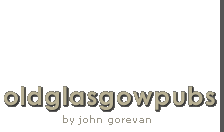Are Darts Illegal.
Darts in Pubs.
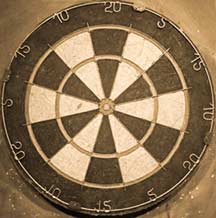
In 1939 a Maryhill publican wrote to the editor of the National Guardian "Sir, Before obtaining a darts board for the use of customers in my shop I should like to know whether there is anything in the general licensing laws, or the by-laws of Glasgow, to prevent such a game being played on my premises." The editor wrote, " The games of darts is not illegal in licensed premises, nor, indeed, is any game illegal except those specially mentioned in the 1910 Licensing (Consolidation) Act. The illegality comes in when any of them are played for money or drink or money's worth. There is no by-law in existence in Glasgow prohibiting the game of darts, nor is there any mention, so far as we are aware, of the game in any of the numerous "recommendations against" issued in the last few years by the Magistrates. But when they frown upon the mild game of dominoes, well, what are they likely to do about darts if the craze spreads to the city?. This was published on the 14th January 1939.
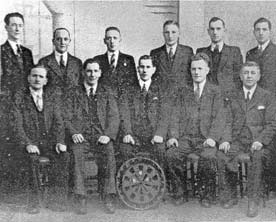
Photograph taken early January 1939.
Seated in the centre of the group is Mr R. G. Courage, president, who, since 1915, was associated with his father, the late Mr D. Courage, who died in 1933. Since then Mr Courage has been in complete charge of the established bar, The Royal Oak, in Marischal Street. He is also hon. president of the Bon-Accord Whilst League (28 clubs), a position he has held for four years. Mr Courage was for several years greatly interested in the breeding of pedigreed thorough bred stock, a business in which his late father was a keen enthusiast and recognised authority.
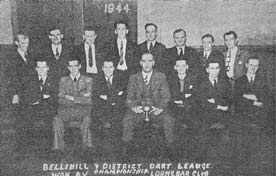
This photograph was taken in 1944.
Darts championships at Wishaw at the Lorne Bar celebrate their victory. Mr Nat MacLeod was the popular proprietor, who won the Wishaw, Bellshill and District Darts Championship and Cup, held a most enjoyable evening in the Masonic Hall, Wishaw, to celebrate the event. The Lorne Bar was the first club to have their name inscribed on the trophy. The Cup was handed over to Mr MacLeod who was chairman of the club, by Mr C. Campbell captain of the team. Do you know anyone in this photograph? if so please get in touch.
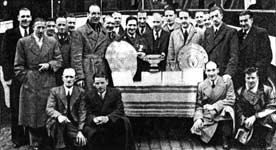
Darts team of Mr Robert McKinnon, 1 Canal Street, Renfrew, with their trophies. photograph taken 1951.
This successful darts team, the darts club was associated with the premises of Mr Robert H McKinnon, 1 Canal Street, Renfrew, had completed a most successful season in the Renfrew & District Amateur Darts Association. They were winners of the first and reserve league championships first league cup and the singles championship. Mr W Holmes being the singles champion. They were also runners up in the reserve league cup and the doubles championship.
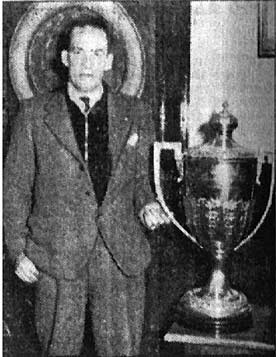
Mr James Thomson with a large trophy. 1951.
The large trophy held by James Thomson was presented by W Murray & Co Ltd, Brewers, Edinburgh for the Scottish individual Darts Championship, competed for annually. Mr Thomson and members of the darts team of the Raith Bar, Link Street, Kirkcaldy. The proprietor at that time was Mr W. P. Hopcroft.
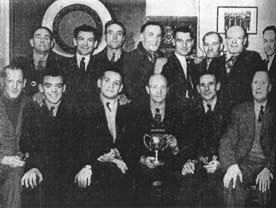
Another photograph from March 1951.
The darts team here were the winners of the Calder Darts Cup, they were all members of the Station Hotel darts club in Alloa, Scotland. The final took place at the Bridge Hotel, Alloa. Mr G. Mathewson of the Station Hotel is on the extreme right in the front row.
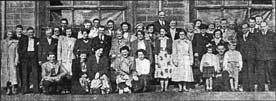
Darts team outing 1952.
Members of the darts team and social club in connection with the Masonic Arms, Inverkeithing, held their annual outing on June 29 1952, the party travelling by bus to Berwick-on-Tweed. Two of the local magistrates accompanied the party, along with the licensee, Mr Harry T. Wilson and his staff.
In 1960 TV, Darts in Public Bars? New moves in Glasgow, views of the Trade Association Sought. The public bars of Glasgow's licensed premises, which at present have neither television sets nor darts boards, may yet finish up with both. After hearing the views of the Glasgow and District Licensed Trade Defence Association, the city magistrates have agreed to the installation of television sets in public bars (up to the present TV sets have been permitted only in lounge bars and in rooms of licensed premises specially approved for the purpose by the Chief Constable.)
The magistrates have made the provision that the television sets must be under the control of the licensee or his staff and that the sets will not be used between 2.15 p.m. and 5 p.m. and after 915 p.m. The magistrates have refused applications for permission to provide "Live" musical entertainment in the lounge bars of two licensed premises in the city centre. With reference to darts, the magistrates have decided to obtain the views of the Glasgow and District Licensed Trade Defence Association on a proposal that darts playing should be permitted in public houses in the city "at all times except on Friday and Saturday nights." Bailie W M Brown, the senior magistrate, explained: "We are hoping that the proposal will lead to a greater spread-over in the drinking habits of the public, and to less heavy drinking on friday and Saturday nights."
If the magistrates depart from past policy and allow the playing of darts, it will be necessary for individual licence-holders to satisfy the Chief Constable that their premises are suitable.
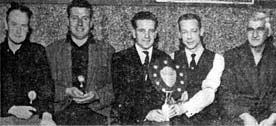
The Southern Darts Team 1964.
The Southern Glasgow Darts league was won by the team representing the Holly Tree Bar, 188 Rutherglen Road, Gorbals, Glasgow, of which the proprietor was Mr James Connolly. The trophy was presented in the Holly Tree Bar to the winning team by Mr R. Smith treasurer of the Southern Darts League. Pictured Mr J Welsh (Captain 2nd Team) Mr F Blackstock (Captain 3rd Team) and Mr T Blake (secretary 1st team) Mr James Connolly proprietor of the Holly Tree and Mr R. Smith with the trophy.
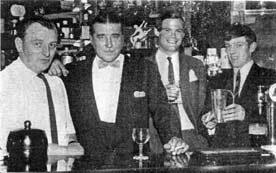
Darts championship gives demonstration. 1965.
A visitor of the Stirling Castle bar, old Dumbarton Road was darts and nail throwing champion Joe Hitchcock. Joe, who is sponsored by Watney Mann, entertained customers with an exhibition game of darts and trick darts and nail throwing. He also played an exhibition game of darts, with Mr W. Bruce who won the pub's singles championship in 1965. From right to left Mr W. Bruce, H Cochrane, Watney Mann, representative, Joe Hitchcock, Mr David Main owner of the Stirling Castle.
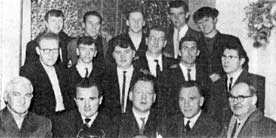
Darts team of the Molls Mire bar, Polmadie. 1965.
For the first time the coveted shield awarded to the championship in the southern darts league in Glasgow, has been won by the Molls Mire Bar, in Polmadie Road. The shield which has been held for several years by the Tirconnel Bar is now proudly displayed in the Molls Mire which they hold for a year. Included in the photo is Mr R. Smith, Mr T McDaid, Mr Sam McGinley, manager of the Molls Mire and Mr W K Doak proprietor. Do you know any of these men? if so please get in touch.
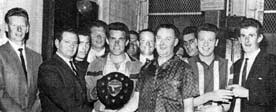
The Darts team of the Citizens Bar, Gorbals, won the Cutty Sark Darts competition. above Mr F Munro, Cutty Sark, congratulates Charles Sweeney of the Citizens Bar on his team's success after handing over the trophy. 1967.

Mr Munro, Cutty Sark shaking hands with Hugh Gallagher of the Tirconnail Bar, Gorbals, who were the runners up. June 1967.
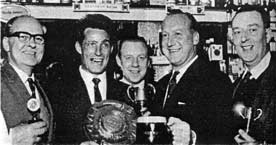
The Guinness Darts Shield for the Gorbals Ward Darts League was won by the Citizen's Bar team, with the Tron Bar as runners-up. Pictured here at the presentation ceremony are from left Mr J Reynolds, licensee of the Tron Bar; Mr Larrie King, Citizen's team Captain; Mr Jimmy Reynolds (not related to the other Mr Reynolds), captain, Tron Bar team; Mr J. A. Baillie, Guinness representative and Mr Charles Sweeney, licensee of the Citizen's Bar. Summer of 1968.
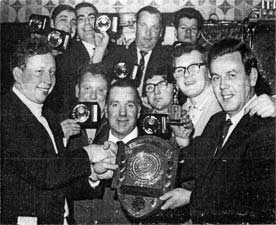
For the 6th time the Old Canteen Bar on the Gallowgate, Glasgow, have won the local Guinness Darts League. Above Mr Des McFarlane (right), area representative for Guinness, presented the Guinness Shield to team captain Jimmy Miller. In the centre of the photograph is the late Mr Davie Lamont, his daughter May worked in many of Glasgow's old east end pubs, May has works in the Hielan Jessie, Gallowgate for many years. The photograph was taken in 1969.
To read more on pubs on the Gallowgate get yourself a copy of Up & Doon the Gallowgate by John Gorevan. A copy can be bought for a few pounds at the Hielan Jessie, Gallowgate or contact me at john@oldglasgowpubs.co.uk
-------------------------------------------------------------
No one knows for sure when darts first came to be. There are lost of theories on this subject. One theory is that when soldiers were bores during the rests between battles were throwing spears and arrows at an upturned wine barrel. The game evolved over time, targets were place on a barrel the cork of the wine barrel being the bull's eye for instance, the bull's eye is still called the cork up to this day.
This eventually led to the use of tree slices being used as boards. The rings in the tree made for perfect scoring and targets. As the tree rings started to crack over time, this further split the board into sections and is believed to be how the spider on modern dart boards came to be. As winter months came the game was brought indoors, shorter darts and standard rules were adopted.
The game of darts didn't reach America until the late 19th century, when immigrants from Britain came over and brought the game to them. It is said that the game of darts as we know it today originated in English pubs hundreds of years ago. Around the end of the 19th century, the game of darts really became what we know of it today.
The barrel of the darts was usually a piece of wood around 4 inch's long with a metal point on one end and the flight made of feathers. The paper flight was patented in 1898 by an American and metal barrels were patented in 1906 by an Englishman. It was also during this time that the numbering system on the boards was created and gained acceptance.
There was a brewery named Hockey & Sons who supplied beer to much of the south west of England. The length of three Hockey & Sons kegs placed end to end became the standard throwing distance. This is generally believed to where the phrase "Toeing the Hockey" came from.
It was during this time that the game really started to gain popularity, especially in pubs. There is a fun story that happened in 1908. At this time, in England, games were illegal and a pub owner in Leeds was brought into court for allowing darts to be played in his premises because it was a game of chance. If the legend is true, when the pub owner appeared in Court he brought along a dart board and some darts. He asked one of the officers of the court to name a number on the board, the officer obliged nand the pub owner then hit this number with three darts. The pub owner then challenged anyone in the court to do the same. A court clerk attempted and failed and the judge immediately dismissed the case because it was obviously a game of skill and not of chance. well that is a good story.
As darts grow popular, more and more pub owners put up dart boards. Naturally as more and more people played, leagues and championships started. The very first organisation was formed in 1924 in England. An English newspaper started sponsoring local competitions which later grow into regional and then national tournaments.
At one point the game grew so popular that the Scottish government tried to ban the game in pubs, saying that it encouraged bad habits, however, the ban never took place. Tournaments really helped to boost the popularity of the game and these tournaments ran from 1947 to date. The game was that popular in England and America. In the mid 1970s darts had become so popular in Britain that the tournaments were being televised. The British Darts Organisation was founded in 1973.
A book from the 1870s could be bought for anyone interested in darts, it gave instructions for making this game at home. "The dart is a straight piece of stick, about 6" long with a pin stuck in at one end and a paper guide at the other. The target is best if made of a piece of wood board and should have painted on it 3 or 4 concentric circles of different colours with a bulls eye in the center." The game was manufactured and available in the shops too, under the name of "Dartelle."
The game was known as Dart & Target according to "Lawful games on Licensed premises in 1904. Brewers started to organise leagues from around 1925, it became a big boost in 1937 when the King & Queen toured a social club in Slough, Berkshire and casually threw darts at a board. The Sunday chronicle reported that the queen had made the women of Britain darts conscious. Like other games in pubs, Darts suffered from laws prohibiting it in places such as Liverpool and Glasgow.
The Burgh Licensing Courts in Glasgow in 1939 decided to ban all kinds of games in 1,100 bars on the grounds that they encouraged drunkenness or more especially what they termed "Ne'er do wellism."
The licensing justices of Liverpool and Glasgow imposed a ban on darts and other pub games a few months before the games popularity was boosted by the Royal Match at Slough. Their reasoning was quiet clear. Despite the level of drunkenness falling all across the nation since the end of World War 2, the level remained very high in these two cities.
The Glasgow & District licensed Trade Defence Association appealed and within a few months the ban was lifted for some games, dominoes included but not darts.
The craze for darts ended by Adolf Hitler and the game would have to wait another 35 years or more before the profile was raised as high or even higher. The ban on darts in both Liverpool and Glasgow stayed in place until after the end of the 2nd World War, however by 1949 the city of Liverpool had become a hot bed of darts and in the early 1950s Glasgow hosted the first ever darts championship in Scotland.
To read more on the History of Darts go to www.patrickchaplin.com Dr Chaplin is the countries best known darts expert known as Dr Darts.
If you have any information on darts please do get in touch. DID you play darts in one of Scotland's pubs or in Glasgow, tell us all about it.
End.
